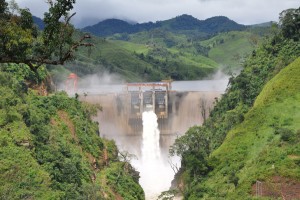Wa Ni Ska Tan: Hydro-electricity and impacts on Indigenous and other communities

“We have no money to fight hydro so we’ve got to fight back with words and with words we can fight back. By telling the truth about what really is happening in these communities.”
– Gerald McKay, Fisher Grand Rapids, MB
Wa Ni Ska Tan in Cree means ‘Wake Up’ or more precisely To “Rise up’ representing a movement of First Nations and Indigenous Communities
LISTEN TO THE SHOW
Click to download the audio (MP3 format)
In Manitoba, residents in the southern community of Winnipeg have benefitted from effort to harness the raw power of those Northern flowing rivers. The surging torrents of water have plowed through dams releasing countless watts of electricity for a growing populace. Lights, motors, machines and, of course, computers depend on these outlets to thrive. Dam power as the champion of ‘clean’ energy is typically recommended as one of the chief replacers of the insidious fossil fuel depots. [2]
One slight problem: the land and people situated at the other end of the hydro-power train are enduring a wide diversity of suffering and developments that have degraded communities. Flooding caused in the wake of the dams damage burial grounds, trapping trails and medicinal tracts on which Indigenous people have endured for hundreds and even thousand of years. Once upset, this complex mix of social, environmental and cultural cohesion starts to unravel adversely impacting generations to come. [3]
Enter Wa Ni Ska Tan. This group is a mix of researchers in academic institutions and community members in these affected communities who forged alliance based on respect for hydro-impacted communities, the high level research the impacts have had on nature and on Indigenous communities, and as a force for social and environmental change. [4]
The group has had annual gatherings at various locales in Manitoba. The last annual gathering took place at the University of Winnipeg from November 8 to November 10, 2019. That event included visitors not only from Manitoba First Nations, but from similar communities across Canada as well as regions around the world, including Latin America and South Asia. [5]
This episode of the Global Research News Hour hopes to delve into some of the dynamics of hydro development, not only from the direct experience of the people on the front lines, but from the role of major investors and corporations profiting in ways not spelled out in popular messaging.
In our first component, Karleen Keeper, Leslie Dysart, and Dr. Ramona Neckoway provide a preview of life in the communities of Tataskwyak Cree Nation, South Indian Lake, and Nisichawayasihk Cree Nation respectively.
In our next installment, Senator Mary Jane McCallum, one of the keynotes, expands on her beliefs of hydro-impacts aligning with other colonial initiatives such as residential schools to essentially erase the identity of Indigenous people.
Then we get perspectives from two Latin American countries: Isabel Cristina Zuleta Lopez from Colombia and Elisa Estronioli from Brazil about the impacts of hydro-power in their communities.
Finally, we get a more in depth conversation with keynote speaker Dr. Deepa Joshi about the forces operating even on the scientific level to corrupt a process of research and activist capacity initiatives springing from water-energy policy, sanitation, irrigation and other policies.
Karleen Keeper is a youth coming from Tataskwyak Cree Nation.
Leslie Dysart is from the Community Association of South Indian Lake. He also sits on the Executive Community and on the Research Steering Committee of Wa Ni Ska Tan.
Ramona Neckoway, PhD is a Professor from the University College of the North, and comes from the community of Nisichawayasihk Cree Nation. She also sits on the Executive Community and on the Research Steering Committee of Wa Ni Ska Tan.
Senator Mary Jane McCallum is a citizen of the Barren Lands First Nation in Brochet, Manitoba. She went to Guy Hill Residential School in The Pas, and then trained as a dental assistant, dental nursing, dental therapy and ultimately Doctor of Dental Medicine. She worked as a Regional Dental Officer from 1996-2000. She has spoken to vast communities about the residential school experience. She was appointed to the Senate of Canada in 2017.
Elisa Estronioli is an activist representing Brazilian Movement of Communities Affected by Dams.
Isabel Cristina Zuleta Lopez is an activist representing the Colombian collective Movimento Rios Vivos.
Deepa Joshi, PhD is a Senior Research Fellow at Coventry University. She is a feminist political ecologist whose work analyses shifts in environmental policies and how these restructure contextually complex intersections of gender, poverty, class, ethnicity and identity. She leads several bilateral projects in South and South East Asia and Africa and she currently coordinates two longitudinal projects on the themes of environmental justice and climate change in the Eastern Himalayas and in the Eastern Gangetic Plains (India, Bangladesh and Nepal).
LISTEN TO THE SHOW
Click to download the audio (MP3 format)
The Global Research News Hour airs every Friday at 1pm CT on CKUW 95.9FM in Winnipeg. The programme is also podcast at globalresearch.ca .
Notes:
- http://hydroimpacted.ca/1-community-stories/
- Richard Heinberg (2003), pg. 149, 150, ‘The Party’s Over: Oil, Water, and the Fate of Modern Industrial Societies’, New Society Publishers
- http://hydroimpacted.ca/more-information/
- http://hydroimpacted.ca/wa-ni-ska-tan-2/
- http://hydroimpacted.ca/2019-conference-new-page-draft/

